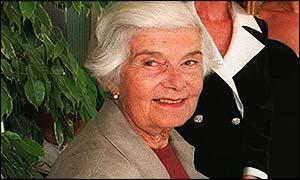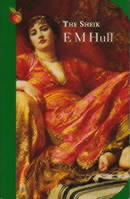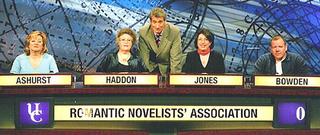Wesley novel's gripping opening
One of the four books I borrowed from my nearest paperback "library" on returning to winter quarters is the Black Swan paperback of
Mary Wesley's Part of the Furniture, published in 1998.

The story starts during an air raid on London in WW2. A young girl, Juno Marlowe, is on her way, alone, from Euston Station to Paddington Station when, with bombs dropping, she is taken into a house by a stranger in whose bed she spends the night. By the morning he is dead. A more gripping opening chapter I can't remember. I can't think how I missed the book when it came out.
Mary Wesley was good at creating interesting minor characters and Bert, the surly cowman in this story, is one of her best. However there were a couple of things in the book I found hard to believe. First, that a girl of 18 could fall in love with a man of 50. At 18 I was training as a junior reporter and one of the unmarried senior reporters was generally regarded as no end of a charmer. He was 30. To me he seemed almost middle-aged. So I felt that was a serious weakness with Wesley's plot.
I also had doubts about the likelihood of Juno sharing a bed and being inexpertly and painfully seduced, in rapid succession, by two upper crust young men, not much older than herself and with no previous sexual experience, both of whom she had known and adored since childhood. As we know, anything, however unlikely, is possible, but writers are unwise to stretch readers' credulity too far, and mine was not only stretched but snapped by that plot device.
I had to pay the "library" four euros [about £2.80 or US$4.77] to borrow
Part of the Furniture, of which two euros will be refunded if I return it. Which reminds me, next time I'm there I must ask the friendly English couple who run the "library", tucked away at the back of a second hand furniture shop in a small Spanish market town, what percentage of their books are returned/kept.
Five expat bookworms lunch together
On Thursday, with four bookish friends, I went to a small restaurant high in the mountains to the south of the valley where we all live. These pleasant occasions were started by Jan Roberts.

After we'd ordered our meal, and the wine had arrived, we settled down to discuss Alexander McCall Smith's The Kalahari Typing School for Men.
At least the others discussed it. I had given up mid-way through Chapter Two. Instead of contributing to the discussion, I had typed out, and made four copies of, an extract from the book Grumpy Old Bookman. If you haven't bought this very amusing book, take a look at 18 May 2004 in the archive at his blog.
GOB's verdict on The Kalahari Typing School includes this comment –
"It's all a bit – well. Twee, frankly. The good characters are decidedly saintly, and the bad guys aren't really all that bad when push comes to shove. So, Professor McCall Smith's Botswana is not, I suspect, the real Botswana, or the real Africa. The dark continent, as far as I can see, remains dark. Indeed it is black, and thoroughly filthy in places. It seems to be a continent of corruption, brutality, and, of course, AIDS. But there are only the tiniest and most distant mentions of any of these problems in the No 1 Ladies' Detective Agency series."
At the end of the piece, he writes –
"Don't let me put you off Professor McCall Smith. Lots of people find him highly entertaining…I suspect that the learned Prof may actually be one of the most ruthlessly commercial writers to have appeared on the scene for some time. Giving the readers what they want, with knobs on."
One of the people at the lunch had brought a clipping of a piece by Harry Eyres in the Financial Times on October 15. She offered to let me have it, but I declined, saying that I could pick it up from the FT website. Then I discovered that only paying subscribers can read FT articles online. A short-sighted policy, in my view.
Listing all the books on my shelves
Two members of the reading group had typed out long lists of books they were willing to lend to the the rest of us. This made me think that it's high time I catalogued all my books. I woke up on Friday morning resolved to list ten every day. As, at a rough count, there are 850 in the sitting room, and many more in other parts of the house, it's going to take me some time to list them all.
Years ago I started to do the job using a spread sheet but got in rather a muddle with it, so a straightforward list is a better bet. On the first day, I came across several books I'd forgotten we had, and a British Museum guide and map, in Spanish, almost invisible tucked between two biographies, and which Mr Bookworm, who bought it some years ago, was delighted to see again.
Virago and The Sheik
Re-visiting Virago's site after a long interval, I was interested to read this –
"LOOKING FOR AN OUT-OF-PRINT VIRAGO BOOK?
We can now offer you the following previously unavailable titles on demand.
Each title will be custom-printed, so you may find yourself paying something more like a hardback price, but this new approach keeps our books in print longer. Take a quick look at our list and order one of your old favourites.
Let us know, too, if there's something that you'd like us to supply in the same way"
One of the titles on offer is The Sheik by E M Hull.
"The wilful heroine of this novel is kidnapped and subjugated by the cruel but strangely compelling Sheik Ahmed, who, it emerges, is not all that he seems. This is one of Virago's trio of turn-of-the-century erotic novels, with "Three Weeks" and "The Way of an Eagle"."

Because the Virago home page has a link marked Stop this cruelty which leads to the Amnesty website, I'm a little surprised that Virago is re-issuing a book in which the "hero" repeatedly rapes the heroine, even though the details are left to the reader's imagination. Of course when the book was first published, and for many decades afterwards, rape was not something which middle class women readers in civilised countries had to worry about.
With only a hazy idea of the torments the Sheik was inflicting on his captive, Diana Mayo, off the page, I read the book in my teens, confident that he would turn out to be Mr Right, in the end. As indeed he did…in fact, even better, Lord Right.
But today's teenagers and even pre-teens are less innocent than earlier generations of E M Hull readers, and it's difficult to see how they can read this story without being repelled by behaviour which they will be able to visualise far more clearly than I did and which, in 2005, seems unforgivable.
More re Cooper's Appassionata
Since posting my friend's criticisms of Jilly Cooper's Appassionata in last Sunday's blog, I've received an interesting email comment from Jenny Haddon who writes as Sophie Weston and is chairman of the RNA.

Jenny writes –
"Interested that your friend took agin Jilly Cooper's Appassionata so much. I do think she has a very particular voice - and the puns, along with a sort of sweet-heartedness, in spite of some very astringent observations - are part of it. If you don't care for it, you don't see any good in the thing at all. Most of the USA would agree with your friend, I hear. I think Cooper is charming - although a curb on the sheer wordage might result in a more focused and, hence, rewarding novel.
On the subject of Jilly Cooper's spelling, Jenny tells me she spotted an astounding boner in The Times on 13 October when under the heading WH Smith returns to full-year profits, she read,
"Books and stationary retailer WH Smith hailed a return to full year profits under turnaround chief executive Kate Swann – but warned of tough high street trading conditions in the weeks leading up to the crunch Christmas period."
Jenny's comment – "Kate Swann must hope it isn't stationary! Mind you, I have no right to sneer at typos. I can never see my own, no matter how eagle eyed I am for other people's."
What is surprising about the stationery/stationary mix-up is that even if the reporter Miles Costello doesn't know the difference – but, in fairness, he may have been telephoning his copy and assumed the copy-taker could spell – one would expect the error to have been corrected by the sub-editor who subbed the report.
Could it be that national newspaper sub-editors are now as scarce as in-house editors at publishing houses? There was a time when a mistake of that order would have led to everyone concerned being subjected to a withering castigation by the editor. As a young reporter I was once on the receiving end of a crushing reproof from the editor-in-chief of Eastern Counties Newspaper for misquoting some bigwig on Norwich City Council. But that was caused by my shaky shorthand, not because I couldn't spell.
